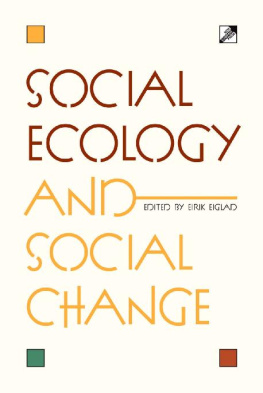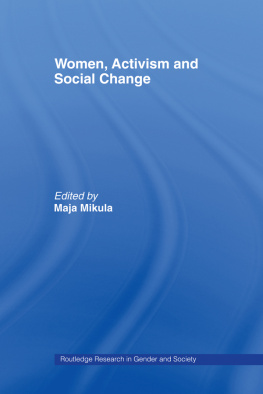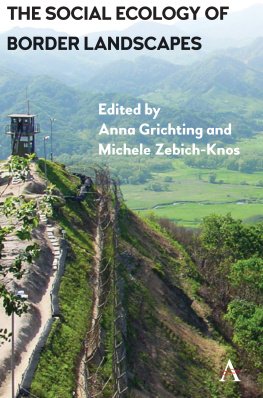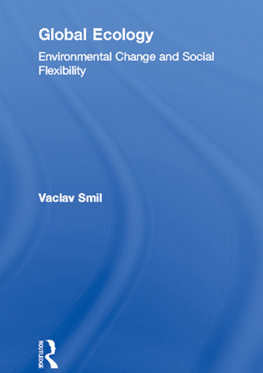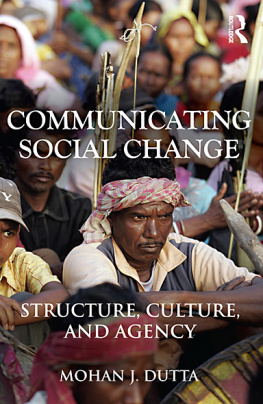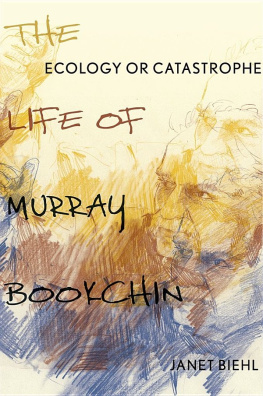Social Ecology and Social Change
2015 by New Compass Press
ISBN 978-82-93064-34-3
ISBN 978-82-93064-35-0 (ebook)
ISBN 978-82-93064-36-7 (hardcover)
Published by New Compass Press
Grenmarsvegen 12
N3912 Porsgrunn
Norway
Design and layout by Eirik Eiglad
The editor received a grant from the Norwegian Research Council.
New Compass presents ideas on participatory democracy, social ecology, and movement buildingfor a free, secular, and ecological society.
new-compass.net
2015
For Murray,
friend and comrade.
SOCIAL ECOLOGY
AND SOCIAL CHANGE
EDITED BY EIRIK EIGLAD

new-compass.net
Contents
Everything Depends On What People Are Capable of Wanting
By Dan Chodorkoff
Climate Change as a Democratic Challenge
By Brian Tokar
Toward an Economy of Repair
By Adam Krause
Capitalism, Communalism, and Citizenship
By Marco Rosaire Rossi
Solidarity Through Citizenship in Social Ecology
By John Nightingale
The American Built Environment as an Ecological Challenge
By Janet Biehl
Are We Inventors or Repairmen?
By Arnost Novk
Toward a Zero Marginal Cost Municipality
By Jonathan Korsr
Radical Approaches to Transport Planning
By Ersilia Verlinghieri
Mobilizing Communities Against Organized Crime
By Monica Caggiano & Salvatore Paolo De Rosa
Ecological Crisis and Third Revolution
By Metin Gven
Toward an Ecology Movement in the Middle East
By Johanna L. Rivera & Toon Bijnens
The Gezi Forums: Toward Direct Democracy?
By Cagri Eryilmaz
Social Ecology and Contemporary Urban Struggles
By Federico Venturini
Participatory Democracy Allows Us To Think What We Are Doing
By Camilla Hansen
The Politics of Ecology and the Ecology of Politics
By Dimitrios I. Roussopoulos
Acknowledgements
In September 2014 , an international conference on ecological politics was organized in Oslo. This conference brought together some 130 scholars and activists to discuss the social and political aspects of climate change and ecological crises.
The conference turned out to be a great success. The presenters and the panelists, the participants and the volunteers, all deserve credit for their contributions.
The conference Ecological Challenges 2014 was hosted by the New Compass collective and The Department for Sociology and Human Geography at the University of Oslo (UiO). We cooperated with the Oslo urban ecology journal Bytopia , the Swedish network Demokratisk Omstllning, and Frnebo Folkehgskola, as well as with The Department for Philosophy, Classics, History of Art and Ideas at the University of Oslo.
Financially, the conference was sponsored by the Norwegian Research Council, the foundation Fritt Ord, the Department for Sociology and Human Geography at UiO, and by New Compass. Generous grants and donations made it possible to invite a broad range of international scholars and activists to present papers, organize workshops, and engage in panel discussions.
I am grateful for the grant from the Norwegian Research Council that made this book possible.
I extend my heartfelt thanks to everyone around New Compass who helps out and supports our project. On behalf of the New Compass collectiveand me personallyI would like to use this occasion to send a special thanks to Camilla Svendsen Skriung, who co-founded New Compass. Her commitment was crucial in our first years of existence.
For this particular book, some deserve special mention, and that is the group of people who have helped me copyedit and proofread the book: Janet Biehl, Mat Little, and Adam Krause offered invaluable assistance, and so too did Sveinung Legard and Peter Munsterman. Thanks also to Camilla Hansen, Jakob Zethelius, Lisa Roth, and Kristian Widqvist, who help run New Compass. Above all, however, I am grateful to the authors for their contributions to this book and our common discussion.
Finally, I would like to express my immense gratitude to Volia, Iskra, Sofi, and Yngvild Hasvik, whose patience and love never cease to amaze me.
Introduction
By Eirik Eiglad
S ocial ecology is a body of ideas that seeks to explain the interplay between nature and culture. Indeed, it seeks to explain why our age is beset with crises, why our society is at odds with nature, and how this rupture and conflict came about.
Social ecologists insist that all ecological problems are really social problems, and that the solutions to todays ecological crises are primarily social and political. According to the late American social theorist Murray Bookchin, even the very idea of dominating nature stems from the domination of human beings by other human beings. How exactly did we come to see nature as an agglomeration of resources available for plunder and exploitation? Because we live in a society that cultivates domination and exploitation.
It is from this perspective that social ecologists come to very radical conclusions. To solve todays ecological crises, we argue, we have to make our social world more egalitarian and more democratic. Indeed, we must create a nonhierarchical society based on municipal democracy and an ecological economy. Only this will allow for a full reintegration and re-harmonization of society with the natural world. The primary objective of social ecology, then, is to create an ecological society.
Bookchin developed these ideas over four decades. From the mid 1960s onward, he ventured into the fields of anthropology, history and sociology, and still further into cosmology, ethics, and epistemology. He sought to provide within a coherent framework the basic pillars for understanding society and its relationship to nature, and the prospects and preconditions for political change. Many of the central ideas that he pioneered have since percolated out into radical circles and the broader ecology movement. But in order to effectuate the social changes we need, we must form bold new movements and a new politics.
T his description of social ecology is admittedly simplistic and rigid, but it does identify our political and analytical point of departure. A basic aim of the book is to demonstrate the nuance of social ecology, rather than how Ive briefly presented it.
This book is a selection from the papers that were presented in September 2014 at an international conference organized in Oslo. The conference brought together scholars from a variety of disciplines and activists from a variety of movements.There we discussed some of the burning questions for ecological politics, such as: What is the role of democracy to solve environmental problems? How can we make our cities green? And how can we develop a broad and yet radical ecology movement?
The first aim I had when preparing this book was to present an overview of contemporary social ecology and some of the questions that concern our movement. Given the nature of the conference there is some thematic overlap between various essays, but I think that is a strength: it helps flesh-out these topics and show how they all relate to each other. I believe that all of these essays are great by themselves, but taken together they provide a broad overview of the quest for a social ecology and the need for social change.
A second aim is to point to areas where this theory can be developed. Where are the weaknesses and what are its strengths? What new developments have entered the historical arena and how can we develop these ideas further?
Third, I wanted to relate this theory directly to existing movements and practices. Social ecology is nothing unless it is tied to contemporary movements and current politics. We should approach new social movements both as insiders and outsiders: we should learn from these movements and help them find their direction.
Next page
